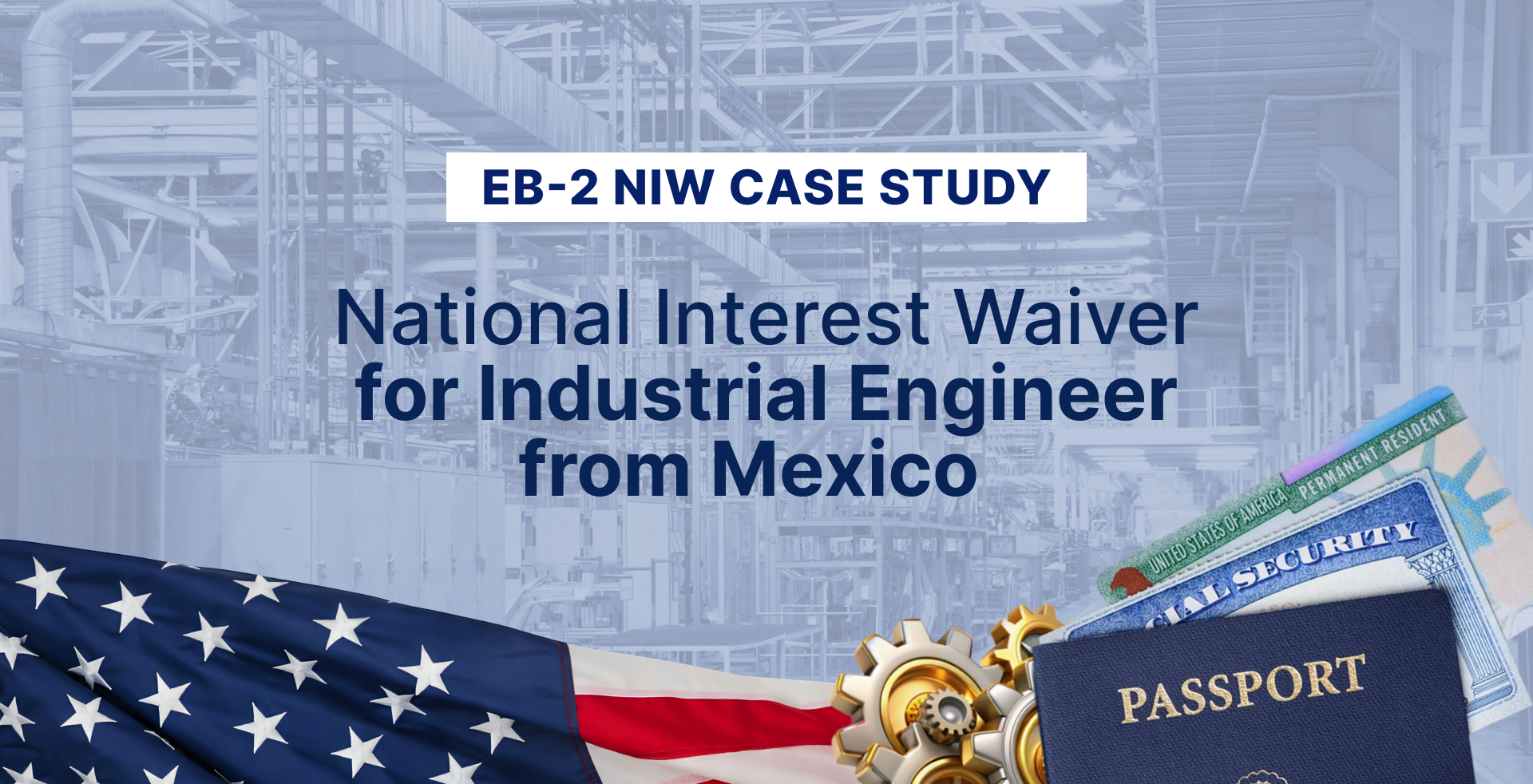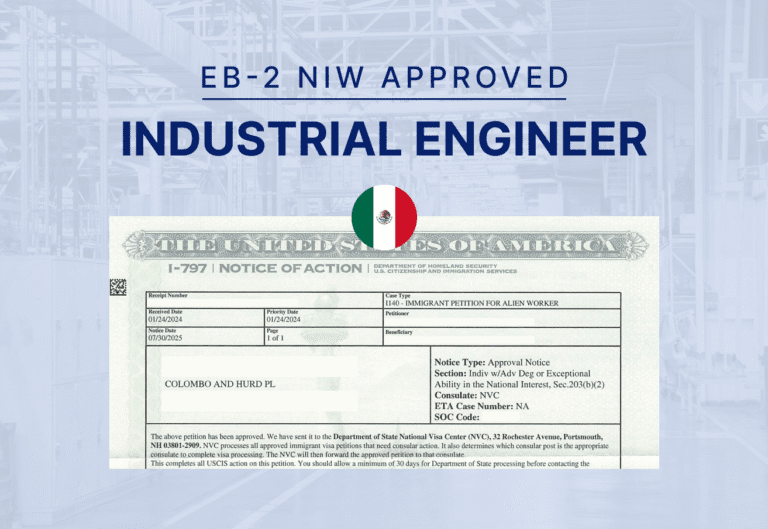In the U.S. industrial sector, manufacturing facilities and distribution centers depend on skilled professionals to optimize supply chain operations. Because their work directly impacts economic resilience and America’s ability to compete in the global marketplace, U.S. immigration law offers pathways to retain this critical talent.
The National Interest Waiver (NIW), a self-petitioned category under the EB-2 classification, allows qualified individuals to obtain permanent residency if they can demonstrate that their work serves the national interest of the United States, without requiring employer sponsorship or a job offer.
Colombo & Hurd Immigration Attorney Yeerin Kwon secured approval of the EB-2 petition with NIW for an industrial engineer from Mexico in July 2025. The client’s journey underscores the hurdles engineers often face in EB-2 NIW cases, and the strategies needed to overcome them.

Our client develops digital solutions to help American companies manage their supply chains

Our client, a Mexican national with a Bachelor’s Degree in Industrial Engineering for Management, sought permanent residency through the EB-2 National Interest Waiver category. This professional had spent years developing digital solutions that could revolutionize how American companies manage their supply chains.
While working across various industries, she had consistently identified bottlenecks, implemented data-driven improvements, and delivered measurable results that boosted both efficiency and profitability. Her work encompassed the full spectrum of modern supply chain optimization: advanced data analytics, process optimization, and the implementation of technology-driven improvements that directly impact organizational performance and competitiveness.
The client’s proposed endeavor was to lead the development and execution of digital and analytics projects that would modernize U.S. companies, driving continuous improvement in supply chain processes to enhance efficiency, growth, and competitiveness on a national scale.
The initial EB-2 NIW petition faced a Request for Evidence (RFE) from USCIS that challenged three fundamental aspects: whether the work was nationally important, whether the client was well-positioned in their field, and whether waiving the job offer requirement would benefit the United States.
“One of the primary challenges arose from USCIS’ concern that the client’s work as an engineer developing supply chain solutions might not have broad national implications, appearing to benefit only the client, her employer and their clients,” explained Ms. Kwon. “In cases involving fields of work that may not be immediately recognized as nationally significant, it is critical to highlight the unique and innovative aspect of the work.”
This RFE represented a common misconception about industrial engineers, whose contributions may not immediately appear as nationally significant as those in fields like healthcare or scientific research. The challenge was transforming this perception by connecting technical expertise to pressing national priorities.
Ms. Kwon emphasized the importance of clarity in these cases: “USCIS officers are not subject-matter experts, and as such, it becomes essential to bridge this gap by providing detailed explanations, well-structured plans, and specific examples of past and future projects. Highlighting measurable impacts, both achieved and anticipated, is important in helping USCIS officers understand the broader importance of the work and its alignment with national interests.”
Our response addressed each challenge by translating abstract concepts into concrete national benefits through compelling evidence and strategic documentation:
Connecting to Federal Priorities: The team demonstrated how the client’s work directly supported multiple government initiatives, including the National Science and Technology Council’s Critical and Emerging Technologies List, which identifies data processing and analysis as essential to national security. They showed alignment with executive orders on supply chain resilience and highlighted programs like the Freight Logistics Optimization Works, a federal data-sharing initiative designed to strengthen supply chain resilience.
Quantifying Economic Impact: Rather than relying on general statements about importance, the response included specific data from McKinsey & Company showing that companies implementing digital supply chain solutions can expect significant earnings and revenue growth. This concrete evidence transformed the client’s work from theoretical benefit to documented economic driver.
Industry Validation: Letters from seasoned supply chain professionals, including an Associate Vice President and a veteran with over 30 years of experience, provided third-party confirmation of the client’s exceptional qualifications and the broader industry impact of their work.
Demonstrating Unique Value: The response illustrated why the client’s multifaceted expertise combining technical knowledge, executive skills, and cultural understanding created value that traditional hiring processes couldn’t capture. A letter from the client’s employer detailed how this unique skill combination made the standard labor certification process impractical.
“To demonstrate the broad economic significance of developing innovative analytics tools and solutions to enhance the reliability and efficiency of supply chains across critical industries, we presented specific, measurable examples of the impact the client’s projects have already achieved,” Ms. Kwon explained. “Additionally, we helped prepare and emphasized the client’s detailed and well-articulated plans for future contributions, focusing on demonstrating the practical, real-world applications of the client’s tools and models.”
Wondering if You Qualify?
Your background may align with the requirements for the EB-2 NIW.
This approval underscores a broader truth about EB-2 NIW petitions for industrial engineers: success often depends on showing how highly technical work translates into national priorities. It’s not enough to highlight professional achievements. Officers need to see measurable economic impact, evidence of innovation beyond routine practice, and a compelling case for why the U.S. benefits by granting flexibility in the job-offer requirement. When those points are made convincingly, even petitions from fields not traditionally associated with the EB-2 NIW can succeed.
For our client, the approval confirmed that her years of developing digital supply chain solutions had real value to the U.S. economy. The case shows that when an engineer can connect technical expertise to pressing national needs like strengthening American manufacturing and supply chains, USCIS will recognize the work as worthy of a National Interest Waiver.
“Highlighting measurable impacts, both achieved and anticipated, is important in helping USCIS officers understand the broader importance of the work and its alignment with national interests.”

